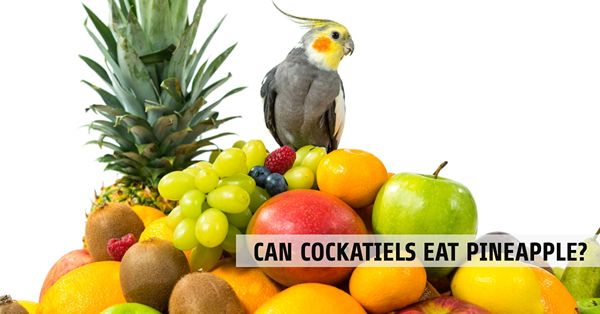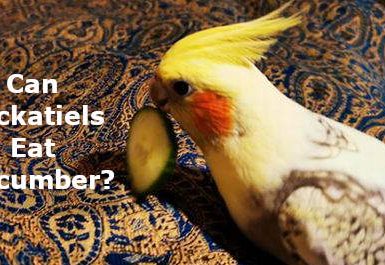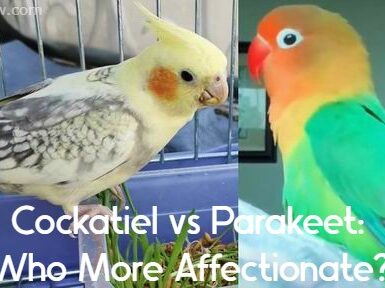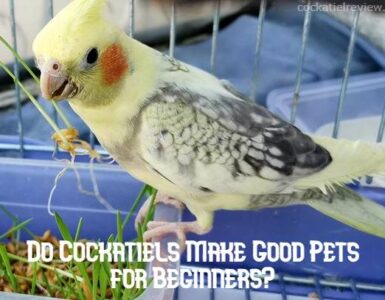 There are many legends about the care of domesticated birds, one of which is that it is possible to offer pineapple to cockatiels. Some owners have no doubt that pineapple is an excellent source of vitamins and could be a supplement to the menu. At the same time, others do not want this fruit for fear of its impact on bird wells and behavior.
There are many legends about the care of domesticated birds, one of which is that it is possible to offer pineapple to cockatiels. Some owners have no doubt that pineapple is an excellent source of vitamins and could be a supplement to the menu. At the same time, others do not want this fruit for fear of its impact on bird wells and behavior.
Is it possible to offer pineapple to cockatiels: is it, not all or a myth?
To understand this issue, we need to know what substances are present in pineapples and that they have every opportunity to affect the body of the cockatiel. For example, pineapple contains bromelain, an enzyme that can facilitate digestion but can also cause mucosal complaints. In addition, pineapple is rich in vitamin C and antioxidants and has all the opportunity to be needed for the well, but only in certain quantities.
The answer to the question of whether a fallen parakeet pineapple can provide is not specific. It all depends on the character of the bird, its eating habits, and its tolerance for certain foods. A balanced menu and veterinary advice must be taken into account to prevent any negative impact on the bird’s welfare.
What is a cockatiel?
The koa is a small bird of the parrot family, showing delicate feathers and striking colors. They occur in Australia, fresh Guinea, Indonesia, and other islands in the Pacific. In the wild, corels usually form small pairs and live at the edge of forests and near rivers and lakes. They are considered fiery birds that like to fly and play, and there is a social element to their behavior.
Corellas are popular for their graceful voices and striking appearance. They are often kept as family caregivers and are very popular for their loyalty and engaging behavior. Bird owners enjoy their pets and are passionate about raising and training them as well as feeding them different types of food.
There are eight different species of ovastaels that vary in size, color, and behavior. Most of these birds have crisp feathers and colorful facial features that make them memorable among other birds. Some types of choler like to live in tropical weather conditions, while others can go to winter frosts thanks to their thick and sneaky fur.
The old man is a long-tailed parrot popular for its own cute character and striking coloring. The gray clawed is considered a well known householder because it is social and easy to contact.
The total length of the Great Tit is 33 centimeters. The bird has wings, but usually cannot fly as high as other parrots. Depending on the breed, colorful falcons vary in color, but are generally colorful and saturated with greenish, yellowish, or blue.
Sources
– Cockatiels loves a balanced diet of cholera seeds, fruits, and vegetables.
– Pineapple is very important but should not be used as a daily food for cockatiels because it is acidic and can affect the bird’s welfare.
– It is important to ensure that the bird’s diet contains all essential vitamins and calories.
Cockatiels are excellent parrots and should be guaranteed a balanced diet with all the necessary ingredients. Sometimes a few slices of pineapple will not hurt, but its introduction as a major component of the menu is not recommended.
Familiarity with Family Standards
Cockatiels are considered one of the most well-known family birds. They are easily tamed and have great character and a colorful appearance. They are quite lively and playful, which attracts many people to this breed.
Under family standards, roosters have every opportunity to be present in cages and witches. This must be spacious for the birds. It is important to provide enough toys and quiet so that the birds are not bored.
Feeding the cockpool does not have to be a special endeavor. They can use all kinds of fruits, vegetables, grains, and other foods. If you do decide to feed the birds pineapples, be careful of their reaction and fitness.
What can cockatiels do?
A cockatiel’s food should be varied and healthy. It needs top quality food that enriches the menu.
Cereals must be menu based. Buckwheat, millet, oats, corn, sunflower and other cholera love seeds. The menu must be added to the menu so that the menu is added to the menu.
Fruits and Vegetables: adding fruits and vegetables to the menu could be added to grains. You want to respond with dried fruits that cholera loves such as plums, and fresh fruits such as apples, pears, grapes, and kiwi. You can also give them vegetables such as carrots, zucchini, and broccoli. Because they are very important for your bird’s well being.
Supplements: the food menu must be enriched with calcium, iodine and other supplements to guarantee the welfare of the bird. Corellel should be supplemented with mineral stones and calcium sticks involved in the digestive process.
Water: Water remains of fundamental importance when feeding birds. Provide birds with fresh water daily to protect them from disease.
Adding pineapple to the cocking menu is a point of debate among experts. While some believe pineapple may be a good addition to the cockatiel’s diet, others are concerned that it may cause stomach complaints. If you decide to give your fallen parakeet pineapple, you must pay attention to their fitness.
Main Foods
- Seeds of all kinds of plants (usually grains and flowers, but some fruits and vegetables can also be given).
- Different grains and their consistency (e.g. wheat, rye, oats, corn).
- Legumes (e.g. peas, chickpeas).
- Additives of all kinds (minerals, vitamins, etc.).
Animal food
- Green vegetables (e.g. lettuce, spinach, etc.).
- Root vegetables (e.g. carrots, beets).
- Fruits (small amounts can be offered, including pineapple, but no more than 2-3 times per month).
- Nuts (e.g., pine nuts, walnuts, almonds).
Nutrition for people
- Dinned products (e.g., bread, baguettes).
- Beef and fish (cooked or roasted without salt and herbs).
- Dairy products (e.g., cheese, yogurt).
- Fruits and vegetables (avoid very sour or tasty foods, e.g. lemons, limes).
Nutritional Factors for Corella
Corella’s are beautiful, colorful birds with special dietary requirements. In nature, they feed on seeds, fruits, flowers, insects.
Do not give your cocatiel food that may be unsafe for him. For example, chocolate, mushrooms, alcohol, salt, fried foods. These have a great chance of harming the bird’s welfare.
Many bird enthusiasts wonder if they can offer falcons parakeet pineapple. Some argue that pineapple is prohibited because it contains drugs that cause irritation of membranes with inflammation of mucous membranes. However, the opposite opinion is that it is possible to pass pineapple in small quantities. It is better to consult a veterinarian than the other way around to prevent health problems in birds.
– It is important to recognize that cockatoos’ diets have unique characteristics.
– It is not possible to supply them with important products.
– The menu must be very diverse so that all vitamins, minerals, and trace elements can be supplied.
– Consult your veterinarian to find out which menu is appropriate for your bird.
Is pineapple an important diet for cockatoos?
Myth: Pineapple is considered an unsafe food for cockatiels.
Fact: Pineapple is not dangerous to the well being of the well, but its use must be limited.
Corella’s Eat Pineapple, but only in small quantities and only occasionally. In large quantities, pineapple can cause aggressive digestive irritation in birds, including diarrhea and vomiting.
There is also a risk of acute pancreatitis in birds that drink very large amounts of pineapple. Acute pancreatitis is a serious illness that can lead to death.
Therefore, cockpool owners should be careful when giving pineapple to their birds and only in small quantities and only once a week. If the bird has digestive problems after using pineapple, it should be removed from the menu.
Myth or reality?
Clear fact: Almost everyone believes that pineapple cannot be given to cockatoos because it contains bromelain, which can cause a plaque layer.
In reality, everything depends on the number of pineapples and the frequency of feeding. Pineapples may be fed only in small quantities. This is because bromelain occurs only in the stem and not in the leaves in the fruit.
Some important precedents follow in the footsteps of the nobility by feeding pineapple to birds:
- Pineapple must be the freshest and cleanest.
- The caloric component of pineapple has the potential to prevent vitamin C deficiency in cocatiels.
- Finch is not allowed to get more than 10% of his menu from the fruit.
- Do not feed very large amounts of pineapple to cockatiels. Do not feed too often.
Final conclusion: the myth that cocatiels cannot get pineapple is not supported by scientific research. However, we do recommend caution when feeding small amounts of pineapple.
Optimal Pineapple Portion Size for Cockatiels: How to Serve Correctly
When it comes to how to offer pineapple to your cockatiels, it is important not only to make sure it is medically acceptable for the bird, but also to choose the proper portion size. There is no definitive answer to this question, as portion size depends on age, amount, and lifestyle.
When choosing a pineapple portion size for cocking:
– Take into account the bird’s authority. It is best to offer no more than 10% of the bird’s total body weight at a time.
– Pay attention to the bird’s reaction to the pineapple. If the bird has not eaten pineapple before, start with small portions and increase numbers slowly.
– Do not offer pineapple as a primary food. It should be a supplement to the bird’s primary food.
IMPORTANT: Some birds may be allergic to pineapple. If you notice any signs of an allergic reaction, stop feeding the fruit immediately.
General advice for feeding fruit to cocking:
– Always check with your veterinarian first for a list of fruits allowed for birds.
– Do not feed citrus fruits to birds – these can cause digestive problems.
– Do not give fruit in bowls, in bones, or by seed – these can cause choking.
If you have any doubts about feeding pineapples to cholera or about the size of some of them, it is advisable to seek advice from your veterinarian.
Further advice.
Consider the originality of the bird. Every cockatiel is unique and can respond in different ways to certain products. If you find that pineapple is not tolerated, it should be avoided.
Do not abuse pineapple. Pineapple has many qualities, but overemphasizing the fruit can lead to health problems in birds.
Choose the right pineapple. It is important to select ripe, juicy fruit free of chemical additives and pesticides. Do not serve pineapple with stains, rotten spots, or unusual flavors.
Pineapples are sweeter than other pineapples. Unlike people, birds cannot taste pineapple. So it is advisable to serve only good-tasting pineapple. Bitter and acidic fruits can cause discomfort in pets and evoke unwanted reactions.
Note the growth potential. Birds will not tolerate spoiled, rotten pineapple. Watch the coolness of the fruit and do not give pineapple that has been stored for more than three days.
- When giving pineapple for the first time, be aware of the bird’s reaction to the fruit.
- If any unwanted symptoms (vomiting, diarrhea, itching) are present, contact a veterinarian immediately.
How do you determine if a pineapple is suitable for cockatiels?
1 Investigate the bird. Before feeding pineapple to Cockatiels, examine a small amount of the bird. If the bird looks healthy and significant, you are likely ready for this new treat.
2. check for allergies. Some birds may be allergic to pineapple and it is advisable to check for reactions to the small fruit before introducing it to the bird. 3.
3. observe the bird’s eating habits. Not all birds love pineapple, so the way to determine if it is a suitable treat for your cholera is to observe their eating habits. If passing pineapple makes the bird more fiery, it is his favorite treat.
4. moderate pineapple to cholera. Like people, birds have a strong need for a balanced diet. If you discover that your cockatiel loves pineapple, remember to give it in moderation so as not to upset the balance.
Quick Answers
Q: Is pineapple unsafe for cockatiels?
ANSWER: According to research, pineapple is not safe in cockatiel wells. However, given the personal characteristics of the birds, do not include too much pineapple on your menu.
Question: Can you provide cans of cans?
Answer: We do not recommend serving canned pineapple because it contains preservatives and additives that can be harmful to birds.
Question: How big should pineapple pieces be for cockatiels?
Answer: the pineapple pieces should be small enough to be swallowed by the cockatiel. It is recommended that the pineapple be cut into pieces of approximately 1 cm.
Question: Can I serve cockatiel every day?
Answer: No, it is not recommended to offer pineapple fruit to roosters every day. However, pineapple contains many vitamins and minerals that can cause health problems in birds if used in large quantities.
Q: Why should pineapple be added to the menu for cockatiels?
Ans: Pineapple contains the enzyme bromelain, which helps digest food. In addition, pineapple contains vitamins C and B6, manganese, and other essential nutrients. However, pineapple is not an important part of the menu and can be replaced with other fruits and vegetables. I was not able to load all the totals. I repeat.






Add comment